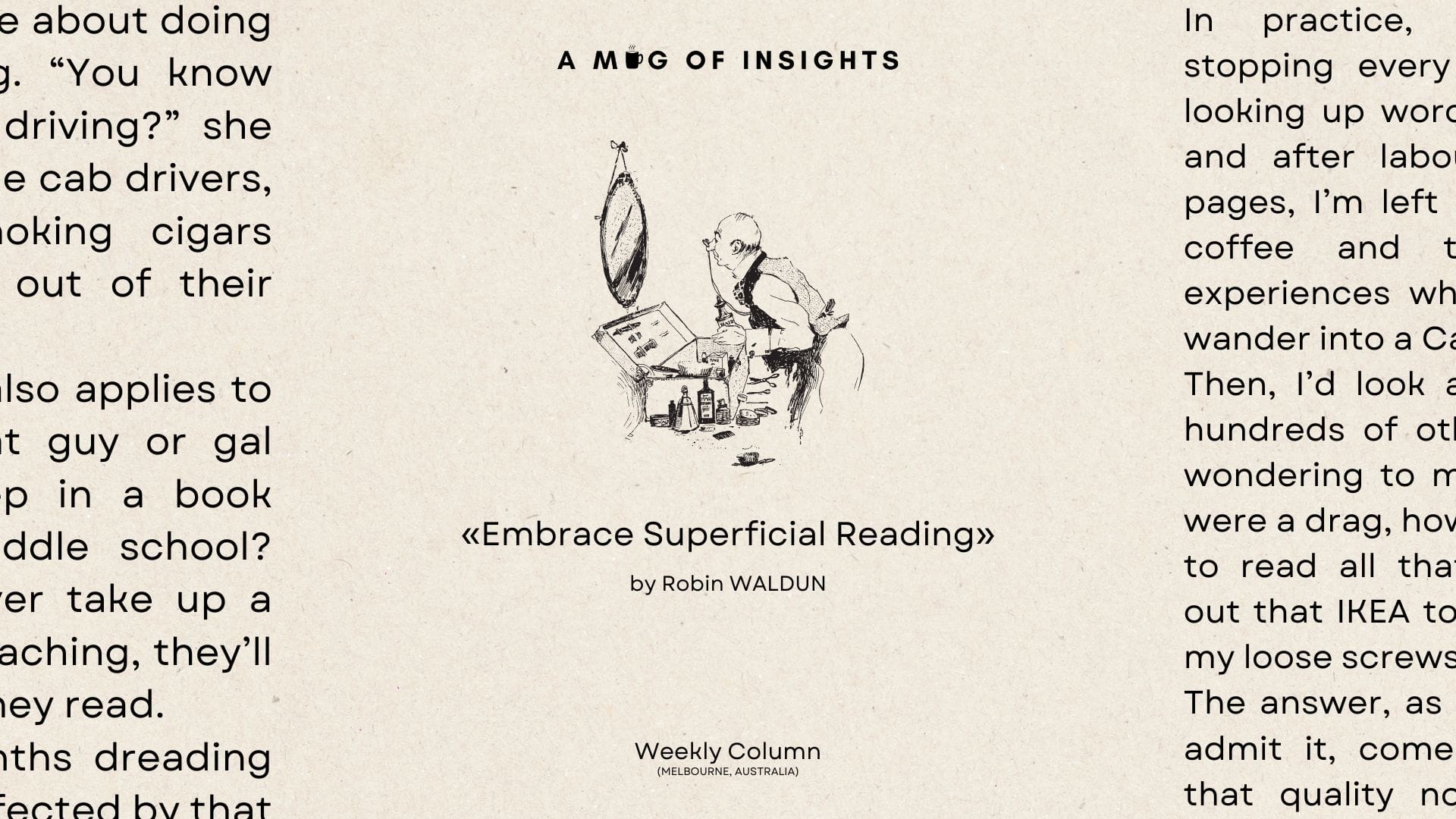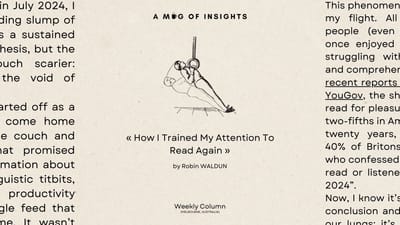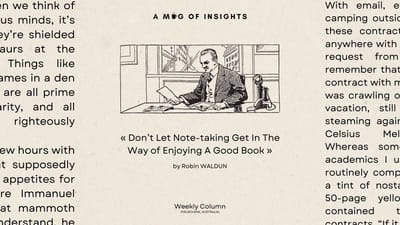Embrace Superficial Reading

A Mug of Insights is 100% a reader-supported newsletter. While you’re here, consider signing up for a paid subscription for $5/month, which will give you access to the 1-2-Read Newsletter with 2 weekly journaling prompts to strengthen your reading/writing skills. Subscribers will also get access to the full archive (posts are automatically archived after six months). Thank you for your contribution!
My mom once warned me about doing what I love for a living. “You know those people who love driving?” she said, “If they ever become cab drivers, they’ll all take to smoking cigars because they’re bored out of their minds.”
And unfortunately, this also applies to reading. Remember that guy or gal who was always head-deep in a book when they were in middle school? Chances are, if they ever take up a career in academia or teaching, they’ll soon dread every page they read.
I spent the last six months dreading reading because I was infected by that “professional reading” mind virus. On the one hand, it’s a blessing. I’m able to use the skills from my degree to parse any reading material with ease. But it’s also a curse, because in trying to understand everything prematurely, I’ve completely lost the joy of reading.
In practice, this looked like stopping every second sentence, looking up words in the dictionary and after labouring through two pages, I’m left with a cold cup of coffee and that despair one experiences when they accidentally wander into a Calculus V class.
Then, I’d look at my bookshelf at hundreds of other daunting titles, wondering to myself: if two pages were a drag, how the hell am I going to read all that without breaking out that IKEA tool set to tighten all my loose screws?
The answer, as much as I dread to admit it, comes from embodying that quality no reader wants to admit with a clear conscience: superficiality.
The word usually has a negative connotation, but now it’s our messiah. For our purposes here, superficial reading stands for, in Mortimer Adler’s words,
“[reading] a book through without ever stopping to look up or ponder the things you do not understand right away.”
Though it sounds good on paper, I can already hear my high school English teacher, Mr. Hunt, trembling from a mile away: “This is no way to become a better reader! You won’t even understand half of the book if you don’t stop and think!” Well, Mr. Hunt. Have you considered that maybe understanding half of the book is better than understanding none?
A lot of people come to me for reading advice, and the common struggle they all share is getting stuck. They secretly believe that if they chew on a passage for long enough, they’ll soon break through to Enlightenment until… they hit a block again. This painful circle continues, and eventually they’ll throw this whole reading business out of the window with the bookshelf, feeling paralysed before even cracking open a preface.
Well, the truth is, no one ever gets it 100% on the first try, not even professional readers. Derrida boasted that he had only read 3-4 books really well, and even Kant had to read Hume twice to reach his eureka moment. So, let’s just assume we’ll never reach the brilliance of a Derrida or a Kant, expecting yourself to understand a book 100% on your first try is positively psychotic.
Plus, as you become a more experienced reader, you’d realise that details and nuance only become apparent after a general overview has been established. You can’t identify Gatsby’s motivations for buying that absurd mansion of his without knowing what the hell happened in the story first. And for non-fiction, you can’t begin to focus on the details without charting out a general overview of the arguments. Or, in Adler’s words:
“In your effort to master the fine points, you will miss the big points… [missing] the forest for the trees.”
So, if you really need it, use this post as a permission to keep reading even if you don’t understand everything. The magic doesn’t usually happen during your first rodeo, it happens way later when you re-read a book you deem worthy. But even if you never re-read it again, remember: getting 50% of it is still far better than quitting and not getting any at all.
Now, everything we’ve discussed here falls under a reading practice called: Inspectional Reading and in next week’s [1-2-Read] newsletter, we’ll explore this topic in depth and give you some practical exercises to work with. If that’s what you’re into, sign up here for a paid subscription so I can refill my coffee machine to keep writing.
Until next week
Robin
Subscribe to my newsletter to get the latest updates and news




Member discussion